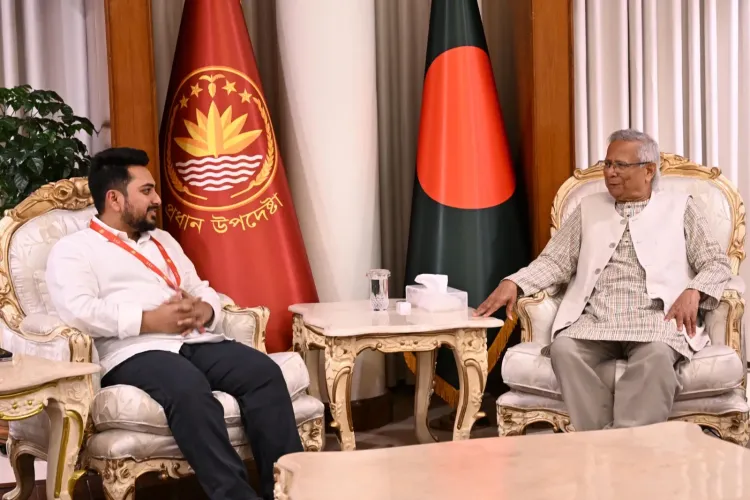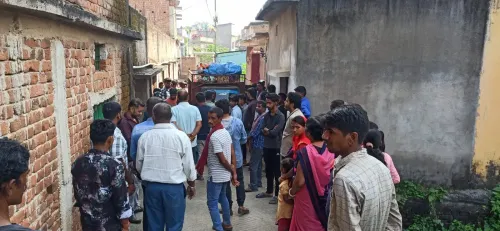What is the future of politics in Bangladesh as Yunus faces unrest?

Synopsis
Key Takeaways
- Political instability is escalating in Bangladesh, with protests demanding reforms.
- Muhammad Yunus faces criticism over his government’s policies and delayed elections.
- Foreign Direct Investment has seen a steep decline, reflecting economic concerns.
- The military calls for a return to a democratically elected government.
- Extremist groups are posing a significant threat to national stability and minority rights.
New Delhi: The absence of a definitive reform agenda and the postponement of elections are escalating significant political turmoil in Bangladesh as Muhammad Yunus, who leads the interim government, engaged in discussions over the weekend with representatives from various political factions questioning his contentious policies and questionable advisors.
On Saturday, Yunus convened with delegations from the Bangladesh Nationalist Party (BNP), Jamaat-e-Islami (JeI), and the National Citizens Party (NCP).
On Sunday, in a similar effort, Yunus met with leaders from 20 political parties in two phases. In the first phase, representatives from 11 parties engaged with him, followed by discussions with another nine parties until late evening.
The primary topics of conversation included political discord regarding the timeline for elections and rising tensions with political factions.
During a virtual event from London, BNP Acting Chairman Tarique Rahman emphasized on Sunday that the stagnation in domestic and foreign investment is a direct result of the lack of a stable democratic regime in the nation. He expressed his party's anticipation for a free and fair national election by December of this year.
In the meantime, another BNP leader cautioned Yunus against delaying the General Elections from December 2025 to June 2026.
"If we take to the streets tomorrow, Yunus will be ousted within 24 hours," stated Gayeshwar Chandra Roy.
Last week, the Chief of Army Staff General Waker-uz-Zaman distinctly articulated at a senior officers' meeting in Dhaka Cantonment that the country urgently requires political stability, achievable only through an elected government and not through unelected authorities.
Zaman also dismissed Yunus's proposed 'Humanitarian Corridor' to Myanmar's Rakhine State, branding it as a "bloody corridor" that threatens national sovereignty.
"The Bangladesh Army will never engage in actions harmful to our sovereignty. No one will be permitted to do so. National interests must be prioritized in all actions, and everything should be dictated by political consensus," Zaman reportedly conveyed to his colleagues.
The events of recent months have fostered a sense of anxiety among the populace regarding the prevailing political and economic instability. Citizens have taken to the streets, staging large protests almost daily, yet the Yunus-led government remains unresponsive to their appeals.
Additionally, the interim government has created a deadlock in revenue collection by implementing reforms on the National Board of Revenue (NBR) prior to the national budget's passage.
Experts suggest that despite Yunus's background as an economist, he has overlooked the fact that Bangladesh is rapidly losing investors, and the ongoing uncertainty threatens the very foundations that rendered the nation appealing to global businesses.
This policy paralysis extends beyond economics into soft infrastructure, increasingly jeopardizing investor confidence.
The inflow of Foreign Direct Investment (FDI) in Bangladesh plummeted to USD $104.33 million in the July-September quarter of the fiscal year 2024-25, marking the lowest level in six years.
Bangladesh experienced a year-on-year decline of 71 percent in foreign investment, dropping from USD $360.5 million in the same period of FY24, as net equity and reinvested earnings saw a downturn, according to data released by the Bangladesh Bank (BB) earlier this year.
Businesses are grappling with a slowdown due to various factors: high inflation, import restrictions, dollar scarcity, political instability, and an unpredictable law and order situation.
Moreover, it is evident that there is a lack of alignment and coordination among key governmental bodies such as the Bangladesh Bank and the National Board of Revenue, as well as various ministries.
Separately, violent protests have now become commonplace in Bangladesh, as radical Islamist parties continue to launch aggressive actions against minority groups, particularly Hindus. The chaotic street mobs, consisting of political activists and radical Islamists, have initiated assaults on Army personnel, rendering the police largely ineffective in Bangladesh.
A growing concern among many Bangladeshis is the visible involvement and increasing influence of extremist Islamist factions whose ideological commitments extend beyond mere democratic participation.
Undoubtedly, the influence of Pakistan's ISI is evident in the ongoing radicalization of Bangladesh, which poses a direct threat to India's northeastern regions.
(The author is a specialist in South Asia and Eurasia, previously associated with the Manohar Parrikar Institute for Defence Studies and Analyses. The views expressed are personal.)









